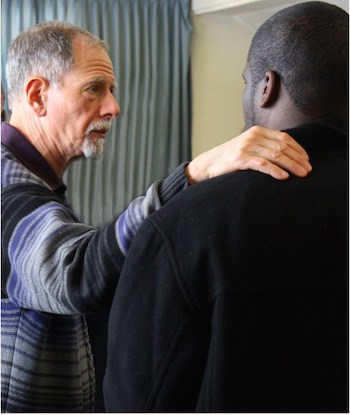This sponsored post was prepared by Dr. George Scipione, Director of the Biblical Counseling Institute at the Reformed Presbyterian Theological Seminary.
 Pastoral work is a lot like combat. You are never truly prepared for battle just by theory or classroom instruction. In combat, physical and spiritual, you need hands-on training in the field. Training for pastoral work must include hands-on training in the art of discipleship.
Pastoral work is a lot like combat. You are never truly prepared for battle just by theory or classroom instruction. In combat, physical and spiritual, you need hands-on training in the field. Training for pastoral work must include hands-on training in the art of discipleship.
Jesus gave His church the job of making disciples of the nations (Matt 28:10-18). This starts by evangelism resulting in baptized members of the Church. Then it is completed by teaching these disciples everything that Jesus taught so that they will be like Jesus and the Father through the Spirit’s resurrection power. Jesus did this with the twelve Apostles. Jesus did this with Paul. Paul did this with Timothy, Titus and others. Timothy did this with faithful men as Paul instructed him to do. This is the true apostolic succession. This is mandated for officers (2 Tim 2:2) and others in the body (Eph 4:1-16) (Titus 2:3-5).
Pastoral work includes public preaching, private instruction, and personal pastoral contact. Today, the third aspect is what most would call counseling. The apostle Paul models this for us. In his address to the Ephesian elders at Miletus (Acts 20), Paul summarized his three years in Asia Minor as a pastor of that church. The gospel of repentance towards God and faith in Jesus Christ was central to each of these three pastoral tasks. The Word of God is the tool for each of these tasks (2 Tim 3:15-17). Paul’s personal pastoral contact was poignantly filled with tears. His was a ministry of passionate personal care, not a corporate or medical model. Paul did not dwell in his study, only leaving to make small steps into the pulpit and back. In this, Paul was like His Master. You will do well to follow in the footsteps of the Good Shepherd and His special under-shepherd, Paul. You need personal skills in working with the flock and much wisdom in applying God’s Word to their lives, especially their struggles. How will you gain these skills?
Most seminaries emphasize preaching as the primary task of the pastor. Preaching must never be neglected. However, expository preaching in the pulpit was only one small aspect of Christ’s and the apostles’ preaching ministries. Expository preaching was in the synagogues. The bulk of their preaching was done outside of buildings and formal worship. The private teaching was from house to house and was interactive. The personal pastoral care most likely happened in homes and other private places. Many seminaries only tip their hats at this private pastoral care and this is a major mistake. New pastors are confronted with serious sin and barely comprehend what to do. Many new shepherds have not developed abilities in working with people, preferring to stay in the comfort and safety of their study. Don’t do this and don’t call a pastor to minister in your church who does this.
Praise God there are many fine options to get training now rather than the paucity that existed in the late 1960’s when I went to seminary. The Reformed Presbyterian Theological Seminary (RPTS) is one of your best options. I was on the ground floor at the beginning of the Biblical counseling movement and have had the honor of helping to train counselors in the first three generations of Biblical counseling both domestically and on five continents. RPTS has small class sizes and personal pastoral training that is on a par with any institution in the English speaking world. We have a global student population and a diverse American student body. The pastoral atmosphere at RPTS will expose you to the best of the past in Biblical counseling, the best of the present Biblical counseling movement, and prepare you practically and theologically for the future. Our professors are pastors and academicians committed to the infallible, inerrant, and all sufficient Word. Visit our website, www.rpts.edu. Come visit us. Better yet, come and study with us. Study under pastors and become more like your Master who is the Wonderful Counselor (Isa 9:6).











